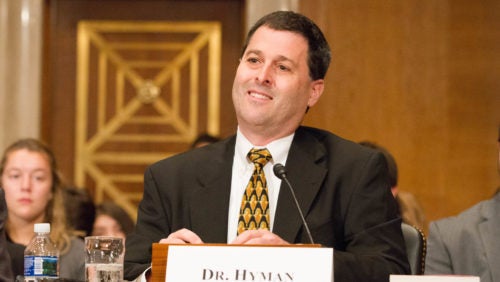Georgetown Law Professor David Hyman Publishes New Book, Testifies Before Congress on the Costs of Health Care
July 5, 2018

Georgetown Law Professor David Hyman testified before Congress on June 27 on the topic of health care costs. He also published a new book — "Overcharged: Why Americans Pay Too Much for Health Care," written with Charles Silver of the University of Texas Law School.
About three-quarters of the way through medical school at the University of Chicago, Professor David Hyman decided he might like to be an attorney in addition to being a doctor. So he started — and finished — law school, also at the University of Chicago, and then went back and completed his medical degree.
“I’m easily bored,” he said, by way of explanation. “Most of the way through medical school, I decided I was interested in policy every bit as much as in clinical medicine. Going to law school seemed like good way to do health policy.”
And that’s exactly what he’s doing. A Georgetown Law professor since 2017, Hyman focuses on the regulation and financing of health care. On June 27, he testified before the U.S. Senate Committee on Health, Education, Labor & Pensions on how to reduce health care costs and why health care is so expensive in the United States.
He provided suggestions for how to resolve the problem of spiraling health care costs, from relying more heavily on first party payments to using prizes rather than patents to encourage drug innovation. He spells out those ideas in a new book — Overcharged: Why Americans Pay Too Much for Health Care, written with Charles Silver of the University of Texas Law School.
The book, published by the Cato Institute on July 3, is full of horror stories about surprise medical bills, outlandish charges and unnecessary treatments. Hyman connects these problems with the core incentives that drive our health care system: everyone perceives they are spending someone else’s money, and there are seemingly no limits on the amounts that providers are willing to charge.
“If we were trying to come up with a system that was expensive by design,” he said, “we’d be hard pressed to do a better job than the system we have.”
Lawrence O. Gostin, University Professor at the Law Center and a fellow health law expert, commended the selection of Hyman to speak before the Senate.
“I can think of no one who would be as wise and qualified to testify to the Senate on health care costs,” Gostin said. “What is beautiful and refreshing about David’s work is that it is informed by empirical evidence. He knows what works and what does not.”
Hyman is undaunted by the challenge of fixing the health care cost conundrum. “I’m fundamentally optimistic about things,” he said, “which is why I continue to work on them.”
After completing his medical degree in 1991, Hyman spent a few years at Mayer Brown in Chicago, then taught at the University of Maryland, Baltimore, and the University of Illinois. His interest in health policy never waned.
“I feel like the work I’ve been doing for quite a long time coincided with popular interest and concern,” he said. His research has led to papers such as “Let’s Make A Deal: Trading Malpractice Reform For Health Reform” and “Policy Limits, Payouts, and Blood Money: Medical Malpractice Settlements in the Shadow of Insurance.”
Best job in the world
Hyman will spend part of the summer preparing a new first-year elective on regulations and regulatory policy.
“Regulating sensibly and cost effectively is a hard thing to do,” he says. In the class, he’ll present case studies of regulatory successes and failures and cited an example of one that was, interestingly, both: the National Do Not Call Registry.
“It was spectacularly successful and then it stopped being successful. Why did it work and then why did it stop working?” Hyman asked, clearly interested in the puzzle. “It’s a great study of a regulatory fix that got gamed.”
He’ll also be teaching civil procedure — what he calls “the nuts and bolts of lawyering” — and a class on consumer protectionism, which involves some aspects of the health marketplace.
“It’s the best job in the world,” Hyman said, “because I get to spend my time working on interesting and important topics and teaching smart and highly motivated students.”